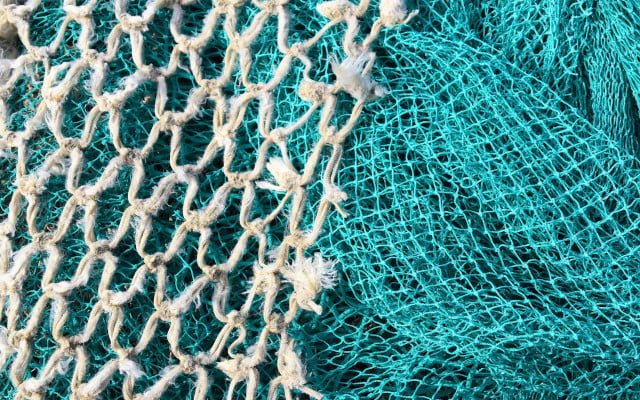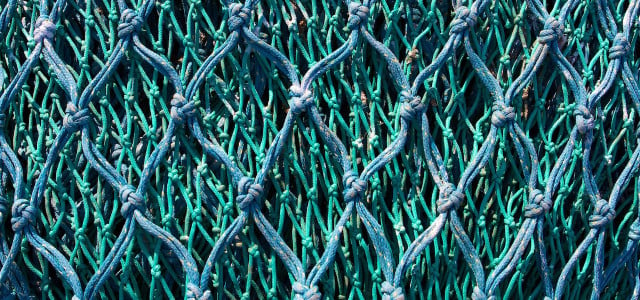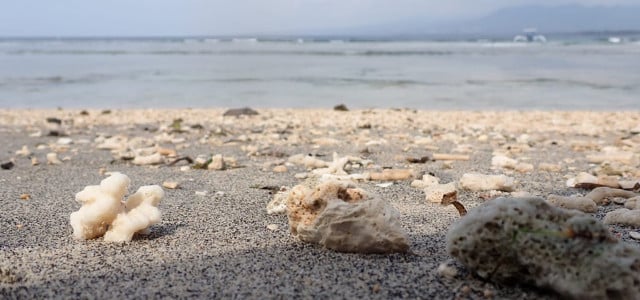Recycled fibers are very much in vogue, but are they really as green as they seem? We’re taking a deeper look at econyl fabric, how it’s made, and the environmental impacts of this recycled fiber.
Similar to Tencel, which is the most well-known brand of lyocell fabric, Econyl is actually the brand name of a fabric made of recycled nylon fibers produced by the Italian company Aquafil. The creators of Econyl wanted to reduce the environmental impact of nylon fabric, which is why this type of fabric is made completely from recycled plastic.
The biggest environmental win with Econyl fabric is the fact that the recycled plastic the company uses comes at least partly from ocean waste, including old fishing nets. Also known as ghost nets, these old fishing nets have been left or lost in the ocean. Not only do they pollute our oceans, they also harm marine life. Animals like sea turtles, dolphins, and seals (not to mention fish) easily get caught in the nets and die. Another way ghost nets harm the environment is that they give off micro-plastic particles. Sea creatures inevitably ingest the plastic particles, and those sea creatures very often end up on our plates.
Did You Know? Ghost nets make up an estimated 46 percent of the Great Pacific Garbage Patch!
Recycled Fiber Production: From Ocean to Clothing

Polyamide 6 waste, like old carpets and fishing nets, is needed to create Econyl fabric. These can be rescued from both landfills and waterways. Once the waste has been collected, it goes through a rigorous process before it can be used to make clothing.
- The plastic waste goes through a heat and steam process to break down the existing nylon polymer into a monomer. A monomer is a molecule ready to be paired with another identical monomer to make a new polymer.
- What is left over is rendered down into a molten polymer state, and then dyed. All 170 colors in the Econyl range are Cradle to Cradle certified.
- The material is then pushed through a spinneret to create the fibers, which can then be loaded onto a small spool called a bobbin.
- Now it’s time for the fibers to be stretched and pulled to increase both their strength and elasticity.
- The fibers are put on a large spool, which is then spun into yarn and can be woven into consumer apparel.
Environmental Impact
While Econyl is avoiding some of the detrimental environmental effects of nylon production, it doesn’t solve the non-biodegradability problem of synthetic fibers. It is still a fossil-fuel-derived fabric, which means it will take ages to break down in landfills – and can cause problems even after. Just like conventionally produced nylon, discarded products made using Econyl still contribute to the microfiber and microplastic crisis. Washing them in the washing machine also releases microfibers that can pollute waterways.
Caring for Econyl Clothing



Nylon is a popular fabric because of its versatility, and Econyl is no different. There is a wide range of products that this recycled fiber can be used to make, including:
- swimwear
- underwear
- jackets
- sportswear
- backpacks
- shoes
On an industrial level, Econyl can also be used to create things like:
- carpet
- rugs
- ropes
Because it is a synthetic fiber, it is very important to properly care for apparel made of Econyl fabric. Generally speaking, nylon is flammable and can melt once ignited. Therefore, washing Econyl on a cold water cycle – and only when it’s necessary – is in the best interest of the fabric. Use a catcher/filter to avoid microplastics and fibers from making their way back into the water systems. Not sure where to get one? Check out:
- Cora Ball
- Guppy Friend Washing Bag
- Filtrol 160, also available on Amazon**
4 Ethical Fashion Brands that Use Econyl
Want to try out Econyl yourself? Check out the following ethical brands that are using Econyl as part of their product line:
- Mara Hoffman: This New York based brand sells a wide variety of clothing including designer one-pieces and bikinis in a variety of colors and styles made out of Econyl.
- Arctic Flamingo: If you’re looking for ethical yoga pants and leggings, this small-scale German company is a great choice. The leggings come in a variety of different colors and patterns, and are hand-sewn in Germany. They’ll also take back any old Arctic Flamingo leggings to turn them into something new!
- Patagonia: For their swimwear, Patagonia uses materials like recycled nylon, and the majority of their products are Fair Trade sewn. This beloved outdoor brand has options for both men and women.
- Reformation: This LA-based company has a great swimwear selection made of Econyl. All products are made in their LA factory. Reformation is currently a carbon-neutral company and aim to be carbon positive by 2025.
Do you like this post?








